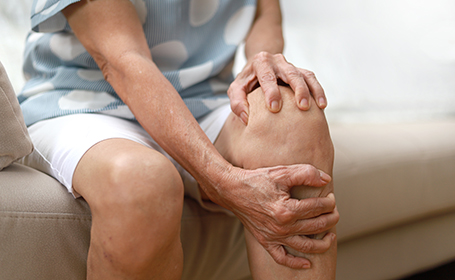
Rheumatoid Arthritis Q&A
What is rheumatoid arthritis, what are the symptoms and how can it be treated? We speak to a consultant joint specialist to find out more about this painful joint condition
What is rheumatoid arthritis?
Rheumatoid arthritis (RA) is an inflammatory joint condition caused by an autoimmune process.
An autoimmune process happens when the body attacks its healthy cells by mistake. This often causes painful swelling.
In a joint affected by RA, the lining becomes inflamed and surrounding tissue is damaged, leading to chronic pain. People most commonly suffer from rheumatoid arthritis in the hands, wrists, hips and knees.
However, RA can affect other parts of the body as well as the joints. This includes the skin and blood vessels (also known as rheumatoid vasculitis).
If you live with rheumatoid arthritis, you will almost certainly experience pain, stiffness and swelling in one or more joints of the body.

What are the symptoms of rheumatoid arthritis?
If you live with rheumatoid arthritis, you will almost certainly experience pain, stiffness and swelling in one or more joints of the body.
This pain can occur in both small joints and large joints as well as in the spine but is commonly felt as knee pain, hip pain and lower back pain.
RA pain typically affects the body in a symmetrical fashion, meaning that you are more likely to experience issues with both of your hips or both knees.
The pain associated with this condition is often described as a throbbing, aching pain and if you suffer from rheumatoid arthritis in your hands, you may not be able to move your fingers properly.
It's also worth noting that RA can cause a consistent feeling of fatigue, which occurs in many other autoimmune diseases.
How is rheumatoid arthritis diagnosed?
Rheumatoid arthritis often takes time to diagnose. This is because it tends to occur in flare ups, meaning you may be unaware of the condition and delay going to the doctor when feeling fit and well.
Plus, symptoms of RA mimic many other conditions (such as lupus and connective tissue diseases), so it's usually diagnosed by process of elimination.
If you think you have RA, you'll need to give a full account of your medical history and risk factors to your doctor before they are able to give you a diagnosis.
While examining you, there are characteristic features of RA that a doctor will look out for. These include physical symptoms (for example knee pain, hip pain or back pain) and trigger patterns.
Blood tests can also help to differentiate the condition from osteoarthritis, or from joint conditions linked to Crohn's bowel disease and a skin condition called psoriasis.

What are the causes of rheumatoid arthritis?
At the moment, it's unclear what causes rheumatoid arthritis.
We understand what causes inflammation (this happens when the body attacks itself), but we do not understand what triggers the process as a whole. Studies suggest there may be genetic and environmental triggers involved, which could affect people with genes that predispose them to developing RA.
The strongest associations with genetic environmental triggers include gender (female) and family history.
What is the difference between rheumatoid arthritis and osteoarthritis?
Rheumatoid arthritis is an inflammatory joint condition caused by an autoimmune process, whereby the body attacks healthy cells.
Meanwhile, osteoarthritis is caused by wear and tear of the joints as we age. It can also be caused as a result of trauma to a joint.
Osteoarthritis often occurs in an isolated joint (for example, a patient may suffer solely from hip pain or knee pain) whereas RA can affect multiple joints and areas of the body.
However, both conditions damage the smooth articular cartilage that allows joints to move smoothly and freely.
What treatments are available for rheumatoid arthritis?
Treatment for RA involves regular reviews with your doctor and a step-by-step approach, but the nature of your treatment will depend on the severity of your condition.
Whether you're at home or on the move, over the counter painkillers and anti-inflammatory drugs can help you to manage any pain that you're feeling. If your pain becomes increasingly severe, specialist drugs called Disease Modifying Anti Rheumatoid Drugs (DMARDs) can be prescribed. As these drugs act on the immune system, you would require careful monitoring by a Rheumatologist.
If treatment does not have the required effect and your joint shows sign of wear (which can manifest in hip pain, knee pain and lower back pain), you will be referred to an orthopaedic surgeon. Orthopaedic surgeons specialise in surgery involving joints, ligaments, tendons and muscles. They often perform pain-killing injections, surgery to remove torn cartilage. Orthopaedic surgeons also carry out joint replacements to remove damaged parts of a joint and replace it with an artificial joint.
Keeping your weight under control and aiming for a Body Mass Index (BMI) within the normal range for your age and sex can alleviate stress from weight-bearing joints such as hips, knees and ankles.
Is it possible to treat rheumatoid arthritis with lifestyle changes?
Yes, there are a number of lifestyle changes you can make to help you manage your pain naturally. These include low-impact exercises such as walking, cycling, yoga or swimming, dietary changes and stress management.
Keeping your weight under control and aiming for a body mass index (BMI) within the normal range for your age and sex can alleviate stress from weight-bearing joints such as hips, knees and ankles.
Enjoy exercise
Keep moving. Exercise (even if it's low-impact exercise) improves blood flow and prevents joints from becoming stiff and painful.
Exercise also builds strength and flexibility, while combatting fatigue. Physiotherapy can help you to exercise despite having painful joints.
Maintain good cholesterol
With rheumatoid arthritis, it’s really important to keep your cholesterol in a good place. Since RA can affect the heart, healthy cholesterol levels will decrease your risk of having a heart attack or stroke.
You can maintain good cholesterol levels by reducing your intake of saturated fats, reducing your alcohol intake and sticking to a balanced diet.
However, there is currently no evidence that complementary therapies, extreme diets or homeopathic remedies can significantly alter the progression of RA and prevent joint damage.
Stop smoking
There is evidence that smoking can predispose people to rheumatoid arthritis. If you need help trying to quit, we have resources available to make your journey easier.
Remember to be kind to yourself
When you’re living with joint pain, inner strength and a positive attitude can go a long way in helping you to manage your condition. Be kind to yourself on difficult days and cultivate a solid support network to see you through.
Joining a support network can also be a fantastic way to meet people who understand what you're going through.

Tags
How do I book an appointment?
If you're concerned about symptoms you're experiencing or require further information on this subject, talk to a GP or see an expert consultant at your local Circle Hospital.